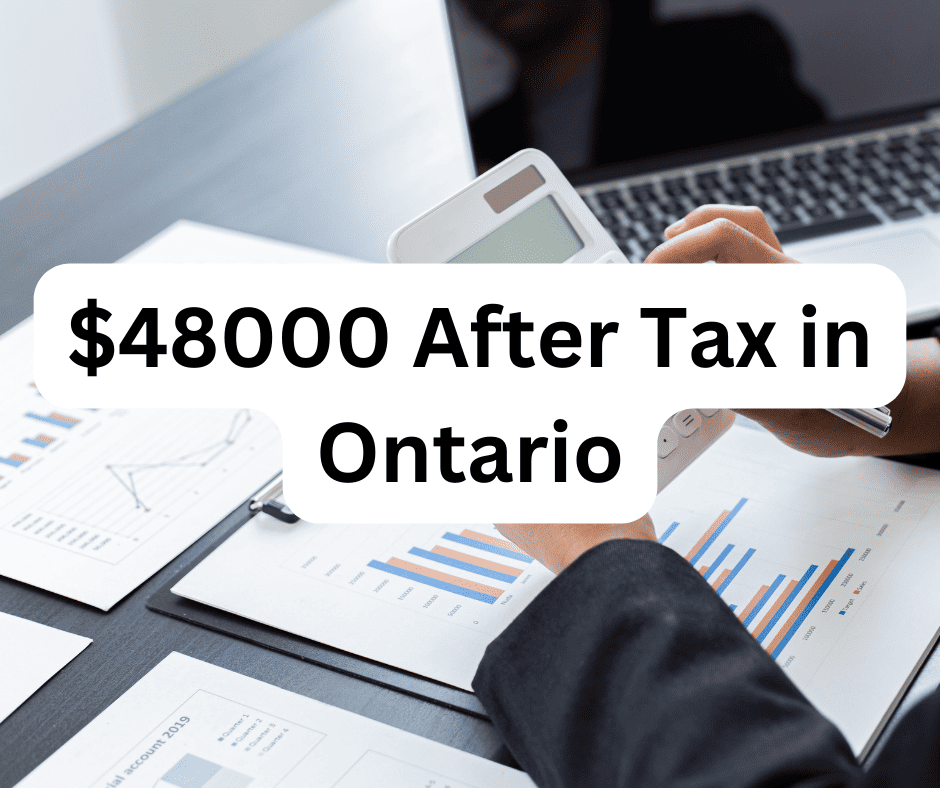Tax Rates
An individual earning $48,000 per year in Ontario would fall into the 11.16% tax bracket for 2024. This means they pay 11.16% tax on every dollar earned above $98,463.
When combined with federal taxes, the total tax rate on $48,000 of income is approximately 26.5%, consisting of:
- 15% federal tax
- 11.16% provincial tax
So in total, someone earning $48,000 per year will pay $12,698 in taxes.
Take-Home Pay
After deducting $12,698 in total tax, the take-home pay or net income on a salary of $48,000 per year is $35,302 annually. This works out to $2,942 per month.
Here is the monthly net pay breakdown:
- Gross monthly income: $4,000
- Total tax (federal + provincial): $1,058
- Net take-home pay: $2,942
Deductions
The main deductions from a $48,000 annual salary in Ontario are:
- Federal tax: $4,403
- Provincial tax: $2,218
- CPP contributions: $2,537
- EI premiums: $759
CPP contributions are set at 5.70% for 2024 up to a maximum pensionable earnings of $64,900. EI rates are 1.58% in 2024 on up to a maximum insurable earnings of $60,300.
In addition to tax and these payroll deductions, other common deductions could include group health insurance premiums, union dues, RRSP contributions, and child care expenses.
Comparison to Other Provinces
Compared to other provinces, the total tax rate on $48,000 of income in Ontario is moderately high. Ontario has the 5th highest total tax rate among the provinces.
Provinces with higher total tax rates on $48,000 of income are:
- Nova Scotia: 29%
- Manitoba: 27.75%
- Quebec: 27.53%
- New Brunswick: 27.05%
Provinces with lower tax rates on the same income include Alberta (21%), British Columbia (22.39%), and Saskatchewan (24.81%).
So Ontario is certainly not the highest tax jurisdiction in Canada, but is on the higher side.
Is $48,000 a Good Salary?
Whether $48,000 represents a "good" salary really depends on individual circumstances and the local cost of living.
Some key considerations:
Compared to Average Salary
- The average individual income in Ontario is approximately $55,500 per year.
- So an income of $48,000 is about 13% below the provincial average.
- It's moderately below average, but could still support a decent quality of life depending on expenses.
Local Cost of Living Considerations
The cost of living in Ontario spans a huge range from small rural towns to the Toronto metro area.
Some examples:
- In Toronto, the average monthly cost of living for a single person is about $4,316. This would be quite difficult on a $48,000 salary resulting in $2,942 per month in net pay.
- In Ottawa, the average monthly cost of living is $3,917, still significant on a $48k salary but more manageable if living frugally.
- In a smaller town like Windsor, monthly costs for a single person average around $2,500, which would provide more room in the budget on this income.
So in high cost of living cities like Toronto and Ottawa, a $48,000 income will mean making some sacrifices and budgeting carefully. But in smaller regions with lower costs, it can support a comfortable lifestyle.
Conclusion
In summary, key points on a $48,000 annual salary in Ontario:
- Total tax rate is 26.5%
- Take-home pay is $35,302 per year or $2,942 per month
- Deductions total $12,698 consisting mainly of federal, provincial taxes and CPP/EI premiums
- Tax rate is moderately high vs. other provinces
- Income is moderately below the provincial average
- Can support a decent lifestyle in small towns but will require careful budgeting in major cities
Whether or not $48,000 represents a "good" salary depends primarily on the local cost of living. In high cost cities, it will mean making some sacrifices, while in smaller towns it can provide a relatively comfortable standard of living.

